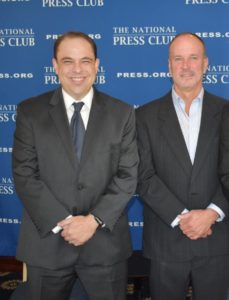Thomas Mew, Davidson ’94, is an experienced litigator with a track record of successfully representing individuals in employment cases. He’s also been a longtime ally to the gay community. Yet, even he didn’t foresee that he would one day play a major role in the fight for LGBTQ rights in this country.
Mew, a partner in the Atlanta-based employment and business litigation law firm Buckley Beal, represents Gerald Bostock, a former advocate for abused and neglected children. Along with another petitioner, Bostock alleged that he was fired from his job for being gay. Their separate cases were eventually combined and heard by the Supreme Court in addition to a case involving a transgender employee. In a ruling issued in June, the court stated employees cannot be fired because they’re gay or transgender.
The decision was based on Title VII of the Civil Rights Act of 1964, which makes it unlawful for an employer to discriminate against a person on the basis of their sex. In a 6-3 ruling, the justices decided the provision extended to sexual orientation and gender identity as well.

This landmark decision now extends federal protection to LGBTQ workers from employment discrimination. Prior to the ruling, only 21 states and the District of Columbia had laws protecting this class of workers, and the extent of that protection varied by location.
“I think this decision is of tremendous importance for LGBTQ employees,” Mew said. “We now have an interpretation from the court that discrimination against members of the LGBTQ community in the workplace is prohibited under law.”
Mew’s thorough research and preparation of Bostock’s case played a huge role in securing this victory. While he did not make the oral argument, he was present at the counsel’s table the day the justices heard the details of the case.
Bostock had been at his job as a child welfare coordinator of a county-based Court Appointed Special Advocates program for 10 years and was commended several times for his performance. Bostock alleges that after he joined a gay softball league and began to speak with teammates about volunteering with the program, he was fired for conduct “unbecoming” a county employee.
“If you looked at the timeline, he did his job for over 10 years, he was showered with accolades, he met with unprecedented success,” Mew said. “His job was to recruit and meet with potential volunteers. It was only when he started entertaining teammates in places that might be deemed gay-friendly that he was fired.
“No one should face discrimination because of who they are, who they love or how they identify. There is so much work still to be done; this country is reeling from discrimination on so many levels. But clearly, this is a step in the right direction for LGBTQ individuals.”
In the years to come, Mew’s contributions to this case are likely to have further implications for the LGBTQ community beyond employment discrimination, particularly in education and public accommodations.
“With this interpretation of sex under Title VII, people will have further ammunition in other areas. I hope the Bostock decision will help further the cause of people looking for LGBTQ equality,” Mew stated.
While the Bostock ruling applied solely to employment discrimination, it has already made an impact on an unexpected area: fraternity and sorority membership. Weeks after the ruling, Harvard University announced it would end a policy implemented to eliminate single-sex student organizations, a win celebrated across the broader fraternity and sorority community. In a message to the Harvard community, Lawrence S. Bacow, the university’s president, said the Bostock case played a part in that decision.
Given that Mew is himself a Fraternity brother, it’s a bit ironic that this case led to the end of a policy that could have negatively impacted undergraduate fraternity and sorority chapters around the country. Mew also noted that it was during his time in college, when he was a member of SigEp’s North Carolina Epsilon chapter at Davidson, that he first became more aware of the importance of protecting the rights of the gay community.
He not only made lifelong friends in the chapter, but has recently reconnected with other brothers because of the media attention given to the case. “I’ve had a number of SigEps from across the country reach out to me to congratulate me on the case,” he said.









Jeff Brewer says
What a great win for diversity and equality. Thank you Brother for defending what is right.